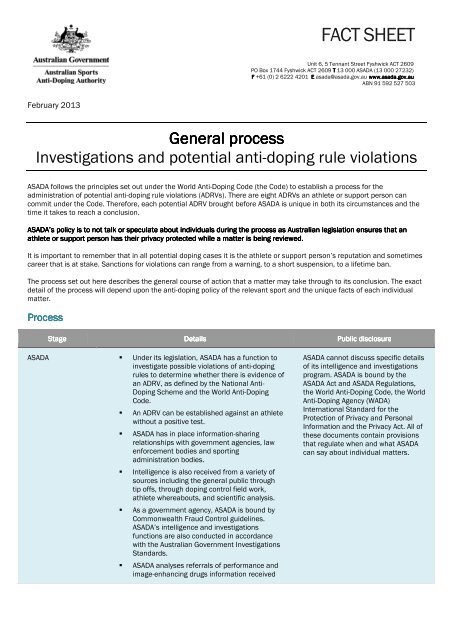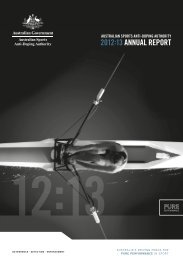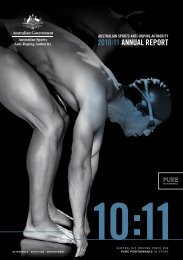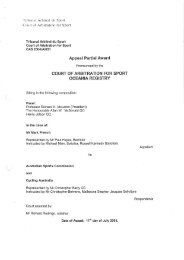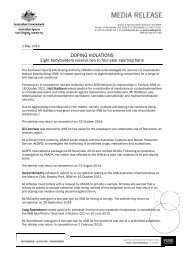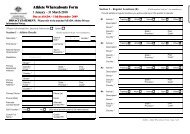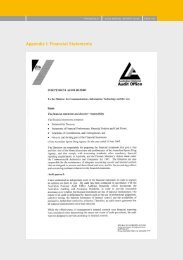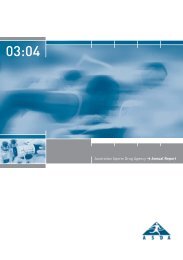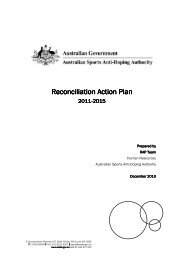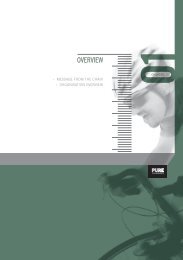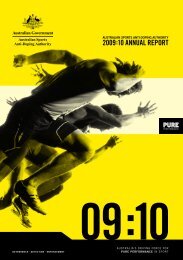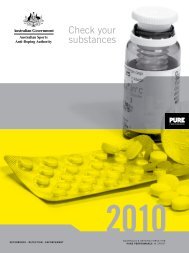Investigations and potential anti-doping rule violations as a factsheet ...
Investigations and potential anti-doping rule violations as a factsheet ...
Investigations and potential anti-doping rule violations as a factsheet ...
You also want an ePaper? Increase the reach of your titles
YUMPU automatically turns print PDFs into web optimized ePapers that Google loves.
FACT SHEET<br />
Unit 6, 5 Tennant Street Fyshwick ACT 2609<br />
PO Box 1744 Fyshwick ACT 2609 T 13 000 ASADA (13 000 27232)<br />
F +61 (0) 2 6222 4201 E <strong>as</strong>ada@<strong>as</strong>ada.gov.au www.<strong>as</strong>ada.gov.au<br />
ABN 91 592 527 503<br />
February 2013<br />
General process<br />
<strong>Investigations</strong> <strong>and</strong> <strong>potential</strong> <strong>anti</strong>-<strong>doping</strong> <strong>rule</strong> <strong>violations</strong><br />
ASADA follows the principles set out under the World Anti-Doping Code (the Code) to establish a process for the<br />
administration of <strong>potential</strong> <strong>anti</strong>-<strong>doping</strong> <strong>rule</strong> <strong>violations</strong> (ADRVs). There are eight ADRVs an athlete or support person can<br />
commit under the Code. Therefore, each <strong>potential</strong> ADRV brought before ASADA is unique in both its circumstances <strong>and</strong> the<br />
time it takes to reach a conclusion.<br />
ASADA’s policy is to not talk or speculate about individuals during the process <strong>as</strong> Australian legislation ensures that an<br />
athlete or support person h<strong>as</strong> their privacy protected while a matter is being reviewed.<br />
It is important to remember that in all <strong>potential</strong> <strong>doping</strong> c<strong>as</strong>es it is the athlete or support person’s reputation <strong>and</strong> sometimes<br />
career that is at stake. Sanctions for <strong>violations</strong> can range from a warning, to a short suspension, to a lifetime ban.<br />
The process set out here describes the general course of action that a matter may take through to its conclusion. The exact<br />
detail of the process will depend upon the <strong>anti</strong>-<strong>doping</strong> policy of the relevant sport <strong>and</strong> the unique facts of each individual<br />
matter.<br />
Process<br />
Stage<br />
Details<br />
Public disclosure<br />
ASADA Under its legislation, ASADA h<strong>as</strong> a function to<br />
investigate possible <strong>violations</strong> of <strong>anti</strong>-<strong>doping</strong><br />
<strong>rule</strong>s to determine whether there is evidence of<br />
an ADRV, <strong>as</strong> defined by the National Anti-<br />
Doping Scheme <strong>and</strong> the World Anti-Doping<br />
Code.<br />
<br />
<br />
<br />
<br />
<br />
An ADRV can be established against an athlete<br />
without a positive test.<br />
ASADA h<strong>as</strong> in place information-sharing<br />
relationships with government agencies, law<br />
enforcement bodies <strong>and</strong> sporting<br />
administration bodies.<br />
Intelligence is also received from a variety of<br />
sources including the general public through<br />
tip offs, through <strong>doping</strong> control field work,<br />
athlete whereabouts, <strong>and</strong> scientific analysis.<br />
As a government agency, ASADA is bound by<br />
Commonwealth Fraud Control guidelines.<br />
ASADA’s intelligence <strong>and</strong> investigations<br />
functions are also conducted in accordance<br />
with the Australian Government <strong>Investigations</strong><br />
St<strong>and</strong>ards.<br />
ASADA analyses referrals of performance <strong>and</strong><br />
image-enhancing drugs information received<br />
ASADA cannot discuss specific details<br />
of its intelligence <strong>and</strong> investigations<br />
program. ASADA is bound by the<br />
ASADA Act <strong>and</strong> ASADA Regulations,<br />
the World Anti-Doping Code, the World<br />
Anti-Doping Agency (WADA)<br />
International St<strong>and</strong>ard for the<br />
Protection of Privacy <strong>and</strong> Personal<br />
Information <strong>and</strong> the Privacy Act. All of<br />
these documents contain provisions<br />
that regulate when <strong>and</strong> what ASADA<br />
can say about individual matters.
from Customs, Law Enforcement bodies <strong>and</strong><br />
any other intelligence sources to determine if a<br />
c<strong>as</strong>e proceeds to investigation status.<br />
<br />
Once a matter becomes an ASADA<br />
investigation there are several steps involved<br />
such <strong>as</strong> interviewing appropriate people <strong>and</strong><br />
gathering relevant evidence of a possible<br />
ADRV. The length of this process varies b<strong>as</strong>ed<br />
on unique circumstances <strong>and</strong> complexity of the<br />
investigation. For instance, the discovery of<br />
evidence may lead to further avenues of<br />
enquiry in an investigation.<br />
<br />
Upon the completion of an investigation, all<br />
relevant evidence <strong>and</strong> material for <strong>potential</strong><br />
ADRVs are referred to ASADA’s Legal team for<br />
review.<br />
<br />
Generally ASADA informs an athlete or support<br />
person <strong>and</strong> their relevant sporting<br />
administration body of an investigation at the<br />
point ASADA decides that there may be a<br />
possible ADRV.<br />
<br />
<br />
In accordance with its legislative framework,<br />
ASADA puts formal allegations of a possible<br />
ADRV to the athlete or support person in<br />
<strong>anti</strong>cipation of the matter being considered by<br />
the independent Anti-Doping Rule Violation<br />
Panel (ADRVP)<br />
The athlete or support person h<strong>as</strong> the<br />
opportunity to make a submission to the<br />
ADRVP prior to their consideration of a matter.<br />
Athletes or support persons are<br />
generally allowed ten days to provide<br />
material to the the ADRVP for<br />
consideration. This timeframe can be<br />
extended at the request of an athlete<br />
or support person. The extension of<br />
time generally occurs in complicated<br />
matters to provide fairness <strong>and</strong> allow<br />
an athlete to obtain <strong>and</strong> provide<br />
relevant information to the ADRVP.<br />
Anti-Doping Rule<br />
Violation Panel<br />
<br />
<br />
<br />
The ADRVP is a decision-making body<br />
independent from ASADA whose members are<br />
appointed by the Minister for Sport.<br />
The ADRVP reviews ASADA’s processes <strong>and</strong> all<br />
relevant evidence in a matter <strong>and</strong> makes<br />
decisions <strong>as</strong> to whether to enter an athlete or<br />
support person’s details onto the Register of<br />
Findings if it believes that a person h<strong>as</strong><br />
possibly committed an ADRV.<br />
An athlete or support person can appeal a<br />
decision of the ADRVP to the Administrative<br />
Appeals Tribunal (AAT). Appeals to the AAT are<br />
only in relation to whether ASADA h<strong>as</strong> complied<br />
with its legislative framework <strong>and</strong> whether<br />
there is sufficient evidence for a possible ADRV<br />
to have been committed. Appeals to the AAT do<br />
not cover issues such <strong>as</strong> possible sanctions<br />
under an individual sport’s <strong>anti</strong>-<strong>doping</strong> policy or<br />
whether an actual ADRV h<strong>as</strong> occurred.<br />
ASADA cannot comment publicly on<br />
ADRVP matters, including whether a<br />
matter is going to the ADRVP or on<br />
the outcome of any decision of the<br />
Panel.<br />
There is no set timeframe to resolve<br />
appeals to the AAT. Athletes or<br />
support persons are allowed 28 days<br />
from receiving notification of their<br />
entry onto the Register of Findings to<br />
make a decision to appeal to the AAT.<br />
Sports Tribunal If an athlete or support person is entered on to<br />
the Register of Findings by the ADRVP, the<br />
athlete or support person will receive an<br />
‘infraction notice’ in accordance with their<br />
sport’s <strong>anti</strong>-<strong>doping</strong> policy.<br />
<br />
The infraction notice will provide the athlete<br />
with the opportunity to have a first instance<br />
Athletes are generally provided a 14<br />
day timeframe to respond to an<br />
infraction notice under their sport’s<br />
<strong>anti</strong>-<strong>doping</strong> policy.<br />
ASADA is authorised to publicly<br />
rele<strong>as</strong>e information regarding the<br />
outcome of a matter (such <strong>as</strong>, the
hearing before a Sports Tribunal (such <strong>as</strong> the<br />
Ordinary Division of the Court of Arbitration for<br />
Sport).<br />
The Sports Tribunal is responsible for finding<br />
whether an ADRV h<strong>as</strong> actually been committed<br />
<strong>and</strong> for imposing any relevant sanction under<br />
the sport’s <strong>anti</strong>-<strong>doping</strong> policy.<br />
Athletes <strong>and</strong> support persons can waive their<br />
right to a hearing. In these c<strong>as</strong>es, the sport will<br />
decide the appropriate sanction in accordnace<br />
with its <strong>anti</strong>-<strong>doping</strong> policy.<br />
Athletes or support persons, ASADA, WADA or<br />
an athlete or support person’s International<br />
Federation may be able to appeal the first<br />
instance Sports Tribunal decision to the<br />
Appeals Division of the Court of Arbitration for<br />
Sport.<br />
Note: Sports Tribunal hearings differ from court<br />
proceedings <strong>as</strong> they are generally closed to the<br />
public. The timeframe for conducting hearings<br />
varies according to the complexity of individual<br />
matters.<br />
name of an athlete or support person,<br />
the length of an athlete or support<br />
person’s ban, the ADRVs committed<br />
by an athlete or support person) once<br />
a final determination h<strong>as</strong> been made<br />
by the relevant sport or a Sports<br />
Tribunal (pending any appeals).<br />
If the athlete or support person does<br />
not elect to go to a hearing, or the<br />
Sports Tribunal decides against the<br />
athlete or support person, ASADA will<br />
issue a public announcement within<br />
20 days of the matter being finalised.<br />
Full written decisions of the Ordinary<br />
Division of the Court of Arbitration for<br />
Sport that an ADRV h<strong>as</strong> been<br />
committed are not always publised<br />
<strong>and</strong> may be confidential. However, <strong>as</strong><br />
outlined above (pending any appeals)<br />
ASADA will publish the outcome of the<br />
matter.<br />
Generally, full written decisions of the<br />
Appeals Division of the Court of<br />
Arbitration for Sport that an ADRV h<strong>as</strong><br />
been committed are available for<br />
publication.


